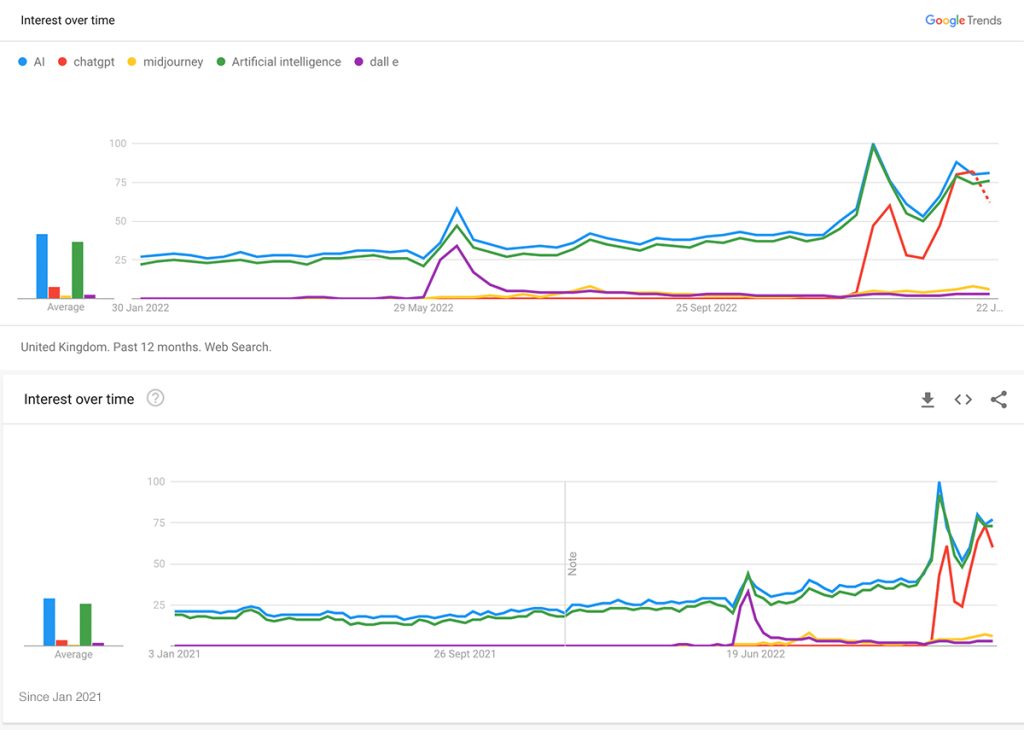There has been an unparalleled amount of hype surrounding the application of Artificial Intelligence (AI) in the tech and marketing spheres in the past few months. In fact, if we look at Google Trends alone (usually a fairly good indicator of trending topics), the chart has some definitive spikes in recent months across keywords like ‘AI’, ‘Artificial Intelligence’, ‘Dall e’, ‘MidJourney’ and the biggest noisemaker, ‘Chat GPT’.

As a marketing and tech professional (and generally a bit of a nerd), I am inherently intrigued and passionate about how AI can be applied to deliver enhanced marketing performance – from content to creative (like the images in this article), and even code generation for websites, the applications are as limitless as our imagination to a certain degree – we’ll save the debate around AI taking our jobs for another article.
In amongst the noise around AI, a huge volume of marketing and tech platforms have sprung up performing a range of functions. In this article, we’ll list 100 AI platforms and tools which you may find useful, but of course as a Sitecore Platinum Partner Agency, let’s start off focusing on the AI capabilities within the Sitecore ecosystem.
Sitecore and AI:
Sitecore is a digital experience platform (DXP) that uses AI in several ways to enhance the customer experience. Some of the main ways that Sitecore uses AI include:
Personalization:
Sitecore uses AI to analyse customer data and personalise the content, layout, and messaging of a website in real-time. This allows for a more personalised and relevant experience for each individual visitor.
Predictive analytics:
Sitecore uses AI to analyse customer data and predict future behaviour. This allows for more targeted and effective marketing campaigns.
Optimization:
Sitecore uses AI to optimise the performance of a website, including the placement of content and the design of pages. This can lead to higher conversion rates and increased revenue.
Automated Campaigns:
Sitecore uses AI to Automate campaigns and deliver them to the right audience at the right time.
Machine learning and Natural Language Processing (NLP):
Sitecore uses machine learning algorithms to understand customer behaviour and preferences and make predictions on what they’re most likely to do next. Sitecore uses NLP to provide a more personalised and relevant experience for each individual visitor. Sitecore’s AI capabilities are integrated into its DXP, which provides a set of tools for content management, marketing automation, and analytics. It allows marketers to use AI to improve the customer experience and drive business results.

Sitecore AI provides the ability to offer personalised content, offers, and experiences to visitors, which will increase conversions and revenue. It also provides marketers with data-driven insights that they can use to improve their campaigns and optimise the customer experience. We’ll mention some more tools from Sitecore’s composable suite below.
Ok, so that’s a brief summary of how Sitecore utilises AI and machine learning in the DXP (the best), let’s continue with the other 100 (the rest) split by some key disciplines:
10 AI tools for DXP, Personalisation & Optimisation:
- Sitecore – A digital experience platform (DXP) that uses AI in several ways to enhance the customer experience including Personalisation, predictive analytics, optimisation and automation.
https://sagittarius.agency/engineering/sitecore/
- Adobe Experience Cloud – A suite of marketing and analytics tools that use AI to optimise customer experience and personalise content. https://www.adobe.com/experience-cloud
- Optimizely – A platform for website optimization that uses AI to personalise and optimise customer experiences. https://ultimedia.agency/optimizely/
- Persado – A platform that uses AI to generate personalised marketing messages and optimise their performance. https://www.persado.com/
- Salesforce Einstein – A suite of AI-powered marketing and sales tools provided by Salesforce. It includes features such as personalised email recommendations and lead scoring. https://www.salesforce.com/products/einstein/overview/
- Marketo Engage – A platform that uses AI to personalise and optimise marketing campaigns across multiple channels. https://www.marketo.com/marketing-automation/
- Segment – A platform that uses AI to analyse customer data and personalise marketing campaigns across multiple channels. https://segment.com/
- Zaius – A platform that uses AI to analyse customer data and personalise marketing campaigns across multiple channels. https://www.zaius.com/
- Evergage – A platform that uses AI to analyse customer data and personalise marketing campaigns across multiple channels. https://www.evergage.com/
- BlueConic – A platform that uses AI to analyse customer data and personalise marketing campaigns across multiple channels. https://www.blueconic.com/
10 AI tools for SEO:
- Moz Pro – A platform that uses AI to track and analyse a website’s SEO performance, including keyword rankings, backlinks, and technical SEO issues. https://moz.com/products/pro
- Ahrefs – A platform that uses AI to track and analyse a website’s backlinks, as well as its performance in organic search. https://ahrefs.com/
- SEMrush – A platform that uses AI to track and analyse a website’s SEO performance, including keyword rankings, backlinks, and competitors’ data. https://www.semrush.com/
- SERPstat – A platform that uses AI to track and analyse a website’s SEO performance, including keyword rankings, backlinks, and competitors’ data. https://serpstat.com/
- DeepCrawl – A platform that uses AI to analyse a website’s technical SEO issues, such as broken links and duplicate content. https://www.deepcrawl.com/
- Conductor Searchlight – A platform that uses AI to analyse a website’s organic search performance and provide recommendations for improvement. https://www.conductor.com/searchlight/
- Botify – A platform that uses AI to analyse a website’s technical SEO issues, such as crawlability and indexability. https://www.botify.com/
- Linkdex – A platform that uses AI to analyse a website’s backlinks and provide recommendations for link building. https://www.linkdex.com/
- RankSense – A platform that uses AI to analyse a website’s technical SEO issues and provide recommendations for improvement. https://www.ranksense.com/
- BrightEdge – A platform that uses AI to track and analyse a website’s SEO performance, including keyword rankings, backlinks, and competitors’ data. https://www.brightedge.com/
10 AI tools for PPC:
- Google Ads – Google’s advertising platform that uses AI to optimise ad campaigns, including targeting, bid management, and ad creation. https://ads.google.com/home/
- Bing Ads – Bing’s advertising platform that uses AI to optimise ad campaigns, including targeting, bid management, and ad creation. https://www.bingads.com/
- Marin Software – A platform that uses AI to optimise ad campaigns across multiple channels, including Google, Bing, and Facebook. https://www.marinsoftware.com/
- Kenshoo – A platform that uses AI to optimise ad campaigns across multiple channels, including Google, Bing, and Facebook. https://www.kenshoo.com/
- Adobe Advertising Cloud – A platform that uses AI to optimise ad campaigns across multiple channels, including Google, Bing, and Facebook. https://www.adobe.com/advertising-cloud.html
- The Trade Desk – A platform that uses AI to optimise ad campaigns across multiple channels and devices. https://www.thetradedesk.com/
- Criteo – A platform that uses AI to optimise ad campaigns, including targeting, bid management, and ad creation. https://www.criteo.com/
- Taboola – A platform that uses AI to optimise ad campaigns, including targeting, bid management, and ad creation. https://www.taboola.com/
- AdParlor – A platform that uses AI to optimise ad campaigns across multiple channels, including Google, Bing, and Facebook. https://www.adparlor.com/
- MarinOne – A platform that uses AI to optimise ad campaigns across multiple channels, including Google, Bing, and Facebook, it also provides cross-channel measurement, insights, and reporting to understand the customer journey across channels. https://www.marinsoftware.com/products/marinone

10 AI tools for Content, Creative & Social Media:
- Sitecore – Sitecore uses AI in several ways to enhance the content creation and delivery process:
- Content personalization: Sitecore uses AI to deliver personalised content to individual visitors based on their behaviour, demographics, and interests. This allows for creating a more relevant and engaging experience for each visitor.
- Content generation: Sitecore uses AI to generate new content based on existing data and information. This allows for automating the content creation process and scaling it.
- Content optimization: Sitecore uses AI to optimise content by analysing data such as engagement rates, conversion rates, and bounce rates. It can then make recommendations for improving the content based on this analysis.
- Predictive analytics: Sitecore uses AI to predict the performance of different types of content and make recommendations on which content will perform best.
- Language detection: Sitecore uses AI to detect the language of the visitor and deliver content in that language.
By using AI, Sitecore can provide a more personalised and optimised experience for each visitor, which can improve engagement and conversion rates. Additionally, by automating and scaling the content creation process, Sitecore can help businesses create more content faster and with more efficiency. https://sagittarius.agency/engineering/sitecore/
- Canva – A platform that uses AI to design and create social media graphics and videos. https://www.canva.com/
- Quill Engage – A platform that uses AI to generate written and visual content for social media. https://www.quillengage.com/
- Adobe Premiere Rush – A platform that uses AI to edit and create videos for social media. https://www.adobe.com/products/premiere-rush.html
- Wochit – A platform that uses AI to create videos for social media. https://wochit.com/
- Deep Vision – A platform that uses AI to analyse and optimise images and videos for social media. https://www.deepvision.ai/
- Lumen5 – A platform that uses AI to create videos for social media. https://lumen5.com/
- Adobe Experience Cloud – A suite of tools that use AI to create and optimise social media content, including Adobe Spark, Adobe Premiere Rush and Adobe Social. https://www.adobe.com/experience-cloud.html
- Rival IQ – A platform that uses AI to analyse social media content and provide recommendations for optimization. https://www.rivaliq.com/
- Agorapulse – A platform that uses AI to optimise social media content and provide analytics on social media performance. https://www.agorapulse.com/

10 AI tools for Email Marketing:
- Sitecore Send – Sitecore Send is an email marketing solution that is part of the Sitecore Experience Cloud. It uses AI to personalise email campaigns and automate email flows in order to improve customer engagement and conversion rates. Some of the ways Sitecore Send uses AI include:
- Predictive sending: Sitecore Send uses machine learning algorithms to predict the best time to send emails to individual recipients based on their past engagement behaviour.
- Segmentation: Sitecore Send uses AI to segment email lists based on factors such as customer behaviour, demographics, and purchase history.
- Personalization: Sitecore Send uses AI to personalise email content, subject lines, and images based on recipient behaviour and preferences.
- Automated flows: Sitecore Send uses AI to automate email flows, such as welcome series, abandoned cart reminders, and post-purchase follow-ups.
- Optimization: Sitecore Send uses AI to optimise email campaigns by analysing data such as open rates, click-through rates, and conversion rates.
By using AI Sitecore Send allows for automating and scaling personalised email communication with customers, which can improve customer engagement and conversion rates. https://sagittarius.agency/engineering/sitecore/
- Omnisend – Omnisend uses AI and machine learning to personalise email campaigns and automate email flows. https://www.omnisend.com/
- Iterable – A platform that uses AI to personalise email campaigns and automate email flows. https://iterable.com/
- Sendinblue – Sendinblue uses AI to power predictive sending, personalise email campaigns and automate email flows. https://www.sendinblue.com/
- Campaign Monitor – This uses AI to personalise email campaigns & perform predictive sending to automate email flows. https://www.campaignmonitor.com/
- GetResponse – A platform that uses AI to personalise email campaigns and automate email flows. https://www.getresponse.com/
- Mailchimp – Mailchimp uses AI-powered personalization feature allows users to create highly personalised and targeted email campaigns by automatically inserting dynamic content into emails based on recipient behaviour, preferences, and engagement. https://mailchimp.com/
- ActiveCampaign – demographics, and help users identify high-value leads and target them with the right campaigns. https://www.activecampaign.com/
- Drip – A platform that uses AI to personalise email campaigns, segment audiences, and automate email flows. https://www.drip.com/
- ConvertFlow – ConvertFlow’s AI-powered personalization feature allows users to create highly personalized and targeted email campaigns by automatically inserting dynamic content into emails based on recipient behavior, preferences, and engagement. https://www.convertflow.com/

10 AI tools for Chat, ChatBots and Co-Browsing:
- Intercom – A customer communication platform that allows businesses to create and deploy chatbots for customer service and sales. It uses AI to understand natural language and provide personalised responses. It also allows you to build complex flows with no coding required. https://www.intercom.com/
- Dialogflow – A platform from Google Cloud that allows developers to build conversational interfaces using natural language understanding and pre-built agent templates. https://cloud.google.com/dialogflow
- Botkit – An open-source framework for building chatbots and conversational applications. https://botkit.ai/
- ManyChat – A visual chatbot builder that allows businesses to create and manage conversational experiences across multiple channels. https://manychat.com/
- Tars – A chatbot builder that allows businesses to create conversational experiences with minimal coding. https://tars.ai/
- Drift – A chatbot tool that allows businesses to create conversational experiences for sales and customer service. https://www.drift.com/
- IBM Watson Assistant – A platform that allows businesses to build, train, and deploy AI-powered chatbots. https://www.ibm.com/cloud/watson-assistant/
- Chatbotify – A chatbot building platform that allows businesses to create chatbots for multiple messaging platforms. https://chatbotify.io/
- Chatbot.com – A platform that allows businesses to create chatbots for multiple messaging platforms. https://www.chatbot.com/
- Chatbot.io – A platform that allows businesses to create and manage chatbots on multiple messaging platforms, by using a simple drag-and-drop interface to build chatbot flows. https://chatbot.io/
10 AI tools for Social Listening and Brand Sentiment:
- Brandwatch – A social listening tool that uses AI to track mentions of a brand across the web and analyse sentiment. It provides a comprehensive picture of the brand’s online presence and reputation. https://www.brandwatch.com/
- Brand24 – A social listening tool that uses AI to track mentions of a brand across the web and analyse sentiment. https://brand24.com/
- Mention – A social listening tool that uses AI to track mentions of a brand across the web and analyse sentiment. https://mention.com/
- Talkwalker – A social listening tool that uses AI to track mentions of a brand across the web and analyse sentiment. https://www.talkwalker.com/
- Digimind – A social listening and brand sentiment tool that uses AI to track mentions of a brand across the web and analyse sentiment. https://www.digimind.com/
- Synthesio – A social listening and brand sentiment tool that uses AI to track mentions of a brand across the web and analyse sentiment. https://www.synthesio.com/
- Hootsuite Insights – A social listening tool that uses AI to track mentions of a brand across social media and analyse sentiment. https://hootsuite.com/insights
- Sprout Social – A social listening tool that uses AI to track mentions of a brand across social media and analyse sentiment. https://sproutsocial.com/
- NetBase Quid – A social listening and brand sentiment tool that uses AI to track mentions of a brand across the web and analyse sentiment. It provides an in-depth analysis of brand performance and customer sentiment, as well as competitor analysis. https://www.netbasequid.com/
- Crimson Hexagon – A social listening and brand sentiment tool that uses AI to track mentions of a brand across the web and analyse sentiment. It provides advanced analytics and visualisation features, such as natural language processing and machine learning algorithms, to help businesses to understand the customer’s voice, track the performance of campaigns, and identify trends and opportunities. https://www.crimsonhexagon.com/
10 AI tools for User Behaviour Analytics:
- Sitecore – Sitecore uses AI to test and analyse user behaviour on a website through its Experience Optimization feature. This feature allows businesses to conduct A/B and multivariate testing on different elements of their website, such as headlines, images, and call-to-action buttons, in order to determine which versions perform best with their visitors.
Sitecore’s Experience Optimization feature uses machine learning algorithms to analyse the data collected from the tests and automatically identify the best performing variations. This can help businesses to optimise their website’s layout and design, improve user engagement and increase conversion rates.
Additionally, Sitecore uses AI-based analytics to monitor user behaviour on websites, such as which pages they visit, how long they stay on each page, and what actions they take. This information is used to create a user profile, which can be used to personalise the website’s content and improve user experience.
https://sagittarius.agency/engineering/sitecore/
- Mouseflow – Mouseflow uses AI to test and analyse user behaviour on a website by tracking and analysing user interactions with the website. The tool records user sessions and tracks user clicks, mouse movements, scrolls, and other interactions. It then uses AI algorithms to analyse this data and generate heatmaps, funnels, form analytics and other insights. https://mouseflow.com/
- ClickTale – Mouseflow uses AI to test and analyse user behaviour on a website by tracking user interactions, such as clicks, scrolls, and mouse movements, and then using machine learning algorithms to analyse that data. The AI is able to identify patterns and trends in user behaviour, such as which pages are most popular, where users tend to drop off, and which elements of the website are causing frustration or confusion. https://www.clicktale.com/
- Hotjar – Hotjar’s AI can test different versions of a website, analyse user feedback and make data-driven decisions on which version to keep. Hotjar also uses AI to analyse user recordings, heatmaps, and form analytics data which allow better understanding of user journey on the website. https://www.hotjar.com/
- SessionCam – SessionCam also uses AI to analyse user recordings, heatmaps, and form analytics data which allow better understanding of user journey on the website, as well as AI to detect and identify potential issues like broken links, javascript errors and slow loading pages. https://www.sessioncam.com/
- Inspectlet – A website user behaviour tool that uses AI to record user sessions and provide heatmaps, funnels and form analytics. https://www.inspectlet.com/
- Crazy Egg – Crazy Egg provides heatmaps, scroll maps, and confetti reports that allow visualising where the users are clicking, scrolling, and interacting on the website. The AI also allows identifying user’s attention areas and their engagement level with the website. https://www.crazyegg.com/
- UserReplay – A website user behaviour tool that uses AI to record user sessions and provide heatmaps, funnels and form analytics. https://www.userreplay.com/
- Clicky – A website user behaviour tool that uses AI to record user sessions and provide heatmaps, funnels and form analytics. https://clicky.com/
- MouseStats – A website user behaviour tool that uses AI to record user sessions and provide heatmaps, funnels and form analytics. https://mousestats.com/

10 AI tools for marketing data and performance analytics:
- Sitecore – Sitecore’s AI capabilities are built on top of the Sitecore Experience Cloud, which uses machine learning algorithms to analyse customer data and make predictions about their behaviour. https://sagittarius.agency/engineering/sitecore/
- Google Analytics: A web analytics service that uses machine learning to analyse website traffic and measure marketing performance. https://analytics.google.com/
- Optimizely: An experimentation platform that uses machine learning to optimise website and mobile app experiences and measure marketing performance. https://ultimedia.agency/optimizely/
- Adobe Analytics: A web analytics service that uses machine learning to analyse website traffic and measure marketing performance. https://www.adobe.com/analytics/
- Mixpanel: A mobile and web analytics service that uses machine learning to analyse user behaviour and measure marketing performance. https://mixpanel.com/
- Omniconvert: A platform that uses machine learning to analyse website visitor behaviour and measure marketing performance. https://www.omniconvert.com/
- Smartlook: A website visitor recording and analytics service that uses machine learning to analyse visitor behaviour and measure marketing performance. https://www.smartlook.com/
- Heap: An analytics platform that uses machine learning to track and analyse user behaviour and measure marketing performance. https://heap.io/
- Kameleoon: An A/B testing and personalization platform that uses machine learning to optimise website experiences and measure marketing performance. https://www.kameleoon.com/
- C3 Metrics: A cross-channel analytics platform that uses machine learning to measure the impact of marketing campaigns across channels and measure marketing performance. https://www.c3metrics.com/
10 AI tools for exploring image and text generation:
- MidJourney AI – One of the most popular image generation platforms utilising AI to creates images from textual descriptions (in fact, the images in this article were created using MidJourney). https://midjourney.com/home/
- GPT-3 by OpenAI: A state-of-the-art language model that can generate human-like text. https://openai.com/gpt-3/
- DALL-E by OpenAI: An image generation model that can create images from text prompts. https://openai.com/dall-e-2/
- Generative Pre-trained Transformer 3 (GPT-3) by Hugging Face: A state-of-the-art language model that can generate human-like text. https://huggingface.co/models?filter=gpt3
- Transformer-based Image Generation by NVIDIA: An open-source library for generating images from text prompts. https://nvidia.github.io/tacotron2/
- DALL-E by PaintsChainer: A web-based platform for generating images from text prompts. https://paintschainer.preferred.tech/
- DALL-E Playground by Yannic Kilcher: A web-based platform for generating images from text prompts. https://dall-e.yannickilcher.com/
- Generative Adversarial Networks (GANs) by TensorFlow: A library for generating images using GANs. https://www.tensorflow.org/tutorials/generative_adversarial_network
- Generative Adversarial Networks (GANs) by PyTorch: A library for generating images using GANs. https://pytorch.org/tutorials/beginner/dcgan_faces_tutorial
- DALL-E by DALL-E Playground: A web-based platform for generating images from text prompts. https://dall-e.app/
This is by no means an exhaustive list and there are probably over 100 other tools to add, but this should help inspire you to think about how to incorporate artificial intelligence into your marketing and technology stack to drive digital transformation & enhance user experience for your brand.
Interested in how Sitecore’s AI capabilities can help support your business? Find out more about how we partner with Sitecore or speak to an expert and get in touch with the Sagitarius team.





